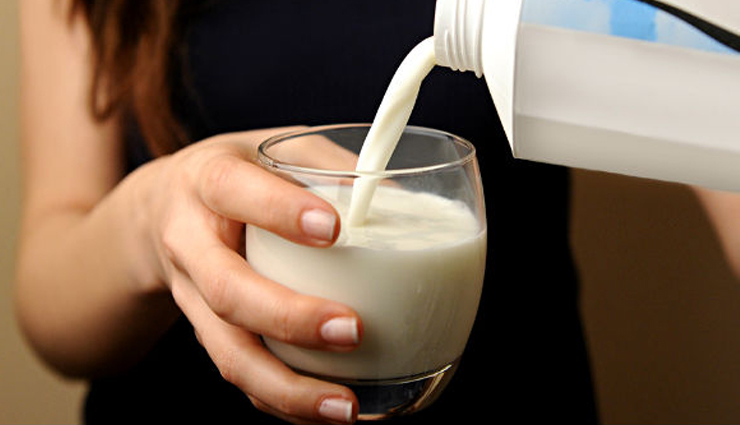- Home›
- Healthy Living›
- 10 Amazing Health Benefits Of Donkey Milk You Need To Know About
10 Amazing Health Benefits Of Donkey Milk You Need To Know About
By: Priyanka Maheshwari Sat, 15 July 2023 11:10:50

In recent years, donkey milk has gained recognition for its incredible health benefits and has become a popular choice among health-conscious individuals. This unique and nutrient-rich milk, sourced from donkeys, offers a plethora of advantages that contribute to overall well-being. In this article, we will explore ten amazing health benefits of donkey milk that are sure to pique your interest and make you consider incorporating it into your diet.

What is Donkey Milk?
Donkey milk, sourced from female donkeys (jennies), is a revered milk variety that has been cherished for centuries due to its unique composition and exceptional health benefits. Unlike cow's milk or goat's milk, donkey milk is considered a specialty milk produced in smaller quantities.
With a similar appearance to cow's milk, donkey milk sets itself apart with a distinctive taste and composition. It boasts a subtly sweet and creamy flavor that delights the palate. Notably, the composition of donkey milk closely resembles human milk, making it more easily digestible for some individuals.
In terms of nutrition, donkey milk shines as a rich source of essential nutrients. It is packed with vitamins (A, B, C, D, and E), minerals (calcium, magnesium, phosphorus, and zinc), proteins, and fatty acids. Additionally, donkey milk contains lactose, the natural sugar present in milk.
Thanks to its unique composition, donkey milk offers a plethora of potential health benefits. It supports immune function, aids in promoting digestive health, nourishes the skin, strengthens bones and teeth, and exhibits anti-aging properties. Remarkably, donkey milk serves as an alternative for individuals who are lactose intolerant or allergic to cow's milk.
Donkey milk is available in various forms, including fresh milk and powdered milk, catering to different preferences. Moreover, it has found its place in the realm of skincare, where it is incorporated into high-quality soaps, creams, and lotions. It is essential to note that donkey milk's limited availability contributes to its specialty status and slightly higher cost compared to other milk varieties.
Nutritional Information Of Donkey Milk
Donkey milk is a nutrient-rich beverage that offers a unique composition compared to other types of milk. Here is a general overview of the nutritional information of donkey milk per 100 ml:
Calories: Approximately 25-30 calories
Protein: 1.5-1.8 grams
Fat: 1.2-1.5 grams
Carbohydrates: 3-4 grams
Lactose: Around 3-4 grams
Calcium: 130-150 milligrams
Phosphorus: 100-120 milligrams
Vitamin A: 25-30 micrograms
Vitamin B2 (Riboflavin): 0.04-0.06 milligrams
Vitamin C: 0.5-1 milligram
Health Benefits Of Donkey Milk

# Rich in Essential Nutrients
Donkey milk is brimming with vital nutrients, including vitamins (A, B, C, D, and E), minerals (calcium, magnesium, phosphorus, and zinc), and proteins. These nutrients are indispensable for supporting various bodily functions, fostering optimal health, and invigorating vitality.

# Boosts the Immune System
Abundant in vitamins and minerals, donkey milk bolsters the immune system, fortifying the body against infections, viruses, and diseases. Regular consumption of donkey milk enhances the body's natural defense mechanisms and elevates overall immune function.

# Supports Digestive Health
Donkey milk contains lactose, a natural sugar that contributes to maintaining a healthy gut flora. It promotes the proliferation of beneficial bacteria, fostering optimal digestion and safeguarding against gastrointestinal issues such as bloating, constipation, and irritable bowel syndrome (IBS).

# Nourishes the Skin and Offers Anti-Aging Properties
Donkey milk has gained acclaim for its remarkable skincare benefits. Enriched with vitamins, proteins, and fatty acids, it deeply moisturizes and nourishes the skin, bestowing it with a velvety softness, suppleness, and radiance. Its anti-aging properties aid in reducing the appearance of wrinkles, fine lines, and age spots, promoting a youthful complexion.

# Soothes Skin Conditions
With its natural antimicrobial and anti-inflammatory properties, donkey milk proves to be an excellent choice for individuals grappling with skin conditions like eczema, psoriasis, and acne. Regular use of skincare products infused with donkey milk can assuage symptoms, alleviate inflammation, and expedite the healing process.

# Strengthens Bones and Teeth
The calcium and phosphorus content in donkey milk contribute to robust bones and teeth. Regular consumption can help thwart osteoporosis, a condition characterized by weakened and brittle bones, while also promoting dental health.

# Supports Cardiovascular Health
Donkey milk boasts low levels of cholesterol and abounds in heart-healthy omega-3 fatty acids. These omega-3 fatty acids assist in lowering bad cholesterol levels, maintaining healthy blood pressure, and diminishing the risk of cardiovascular ailments.

# Allergen-Friendly Alternative
Donkey milk is often well-tolerated by individuals who are lactose intolerant or allergic to cow's milk. Its composition diverges from that of cow's milk, making it a suitable alternative for those with dairy-related allergies or sensitivities.

# Enhances Brain Function
The presence of vitamins and minerals in donkey milk optimally supports brain function. It aids in cognitive development, memory retention, and concentration. Regular consumption may also reduce the risk of age-related cognitive decline.

# Natural Stress Reliever
Donkey milk contains compounds like lactose and casein, which promote relaxation and aid in stress alleviation. The milk's soothing properties exert a positive impact on overall mental well-being.

How To Add Donkey Milk To Your Diet
Enjoy it Fresh: Indulge in the refreshing experience of sipping a glass of chilled donkey milk, relishing its nourishing qualities as a standalone beverage.
Wholesome Smoothies: Blend donkey milk with your preferred assortment of fruits and vegetables, crafting delightful and nutritious smoothies. Enhance the flavors and nutritional content by adding ingredients such as bananas, berries, spinach, or almond butter.
Unique Coffee or Tea Additions: Infuse your coffee or tea with the creamy texture and subtle sweetness of donkey milk. Replace regular milk with this distinct alternative, adding a touch of novelty to your hot beverages.
Creamy Cereal or Oatmeal: Elevate your breakfast routine by pouring donkey milk over your favorite cereal or oatmeal. Experience the pleasant flavor and heightened nutritional profile it lends to your morning meal.
Culinary Delights: Experiment with donkey milk as a substitute for cow's milk in various culinary creations. Use it to whip up delectable pancakes, muffins, cakes, or even creamy sauces and soups, relishing the unique taste and nutritional benefits it brings to your dishes.
Homemade Yogurt or Cheese: Craft your own homemade yogurt or cheese using donkey milk. If you revel in the art of dairy product creation, consider employing donkey milk as a substitute for cow's milk, infusing your creations with a distinctive flavor and additional nutrients.
Frozen Treats: Unleash your culinary creativity by concocting homemade ice cream or popsicles with donkey milk. Combine it with your choice of fruits, sweeteners, and flavorings to fashion a creamy and nutritious frozen delight.
Skincare Elixirs: Although not consumed orally, donkey milk finds its purpose in skincare products. Look for soaps, creams, or lotions infused with the nourishing and hydrating properties of donkey milk to revitalize your skin.
Remember to store donkey milk appropriately in a refrigerator and adhere to the recommended consumption timeline. It's essential to note that donkey milk may not be as readily available as other milk varieties, necessitating exploration of local farms, specialty stores, or online sources to acquire it.
Potential Side Effects Of Donkey Milk
# Allergic Reactions
Some individuals may have an allergic reaction to donkey milk, similar to other types of milk allergies. Symptoms can include hives, itching, swelling, digestive issues, or difficulty breathing. If you have a known milk allergy or experience any allergic symptoms, it is advisable to avoid donkey milk.
# Lactose Intolerance
Donkey milk contains lactose, a natural sugar found in milk. Individuals with lactose intolerance may experience digestive discomfort such as bloating, gas, or diarrhea after consuming donkey milk. If you have lactose intolerance, it is recommended to monitor your tolerance level and consider alternative milk options or lactase supplements.
# Cross-Reactivity
Some individuals with an allergy to cow's milk may also be sensitive to donkey milk due to cross-reactivity. If you have a known allergy to cow's milk, it is important to exercise caution when consuming donkey milk and consult with a healthcare professional.
# Contamination
As with any food product, there is a potential risk of contamination, which can lead to foodborne illnesses. It is important to ensure that donkey milk is sourced from reputable and hygienic sources to minimize this risk. Proper storage, handling, and pasteurization methods should be followed.
# Interactions with Medications
Donkey milk contains certain components that may interact with medications. If you are taking any medications or have underlying health conditions, it is advisable to consult with a healthcare professional before adding donkey milk to your diet to ensure there are no contraindications or adverse effects.





